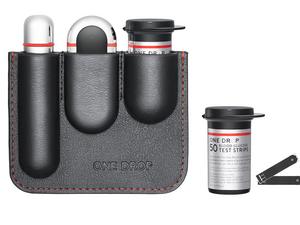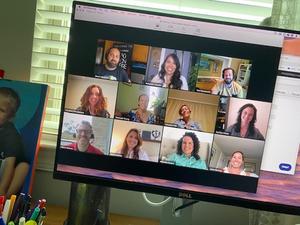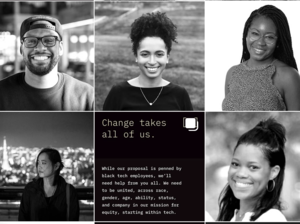Boxes of SXSW T-shirts. A bicycle store. Warehouses. Vacant coworking and expo center space. Several startup founders. Community and health leaders. And hundreds of volunteers.
That’s just some of what it took in the early days of the Covid-19 pandemic for Austin to help protect its most vulnerable residents and frontline workers.
March may seem like a lifetime ago. But the hustle, networking, innovation and good old fashion volunteer spirit in those early weeks helped limit the initial spread of the disease. And, perhaps as importantly, that community collaboration bought valuable time as traditional supply chains recovered and ramped up.
Through recent interviews with Austin entrepreneurs and leaders who took action in the early days of the pandemic and reporting on local startups and innovations over the past six months, we’re taking a closer look at how the community came together to help flatten the curve and highlighting several of the most impactful efforts.
Early Days: Mellie Price and the Austin entrepreneurial network
Mellie Price is a serial entrepreneur who is well known in the startup community, and, more recently, in the health tech community through her work with Dell Medical School.
Almost as soon as news emerged that the novel coronavirus was spreading at an uncontrollable rate globally, much of the personal protective equipment that Austin frontline workers needed had nearly vanished from traditional supply chains.
Price sprang to action. She and groups of volunteers began gathering just about any potentially useful materials they could find. And she found a lot of willing collaborators across the city.
Bicycle Sport Shop opened its parking lots to serve as drive-thru donation drop offs for PPE. SXSW donated T-shirts to be repurposed into masks and tote bags to fill with other supplies. Osano founder Arlo Gilbert donated about a thousand 2 oz. bottles of hand sanitizer to be distributed to nursing homes. Vuka offered part of its coworking space to warehouse supplies. SignUp.com founder and CEO Karen Bantuveris offered its app to help coordinate volunteers. And the list goes on…
“It was a function of the Austin tech community that this happened,” Price said. “It was the power of Twitter. It was the power of the entrepreneurial network.”
In the course of about a week, Price and fellow collaborators had stood up the basic infrastructure to distribute many hard-to-find items and channel them to those who needed it most – hospitals, nursing homes, homeless shelters and emergency responders.
“That was really an initiative of the community,” she said. “It was really powerful.”
Simultaneously, several projects were evolving to help Austin’s most vulnerable, develop mass scale virus testing and help calm a community dealing with a new and terrifying enemy. And Price’s initial efforts began to meld with other community groups and institutions, including Dell Medical School and Austin Public Health.
With that, Price focused exclusively on volunteers and broader coordination before shifting gears once again to work with biotech company Babson Diagnostic, which was exploring Covid-19 testing and research, and Dr. Ester Melamed, a neurologist at Dell Medical School. In that project, which we’ll explore more below, the company and partners helped develop a high-sensitivity blood test that was approved in the U.S. and Europe.
Austin Emergency Supply Foundation joins an ‘arms race’ for supplies
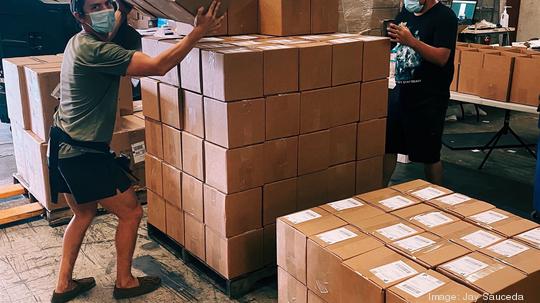
Perhaps the one thing everyone had in common in the early days was a profound sense of uncertainty. And for many entrepreneurs that meant sprinting toward an unknown finish line without much of a map.
“At the start, we just didn’t know how it’d go,” Jay B. Sauceda recalled.
Sauceda, founder of warehousing and third-party logistics company Sauceda Industries, was part of the team that founded Austin Emergency Supply Foundation, an effort to source and distribute at cost or as a donation everything from masks and gloves to respirators and thermometers.
Sauceda said he got a call from Eugene Sepulveda, CEO of Entrepreneurs Foundation and a close associate of Mayor Steve Adler, asking him if he’d work with Jonathan Coon, the founder of 1-800-Contacts and Wikibuy, in an effort to develop a supply chain for the Austin community.
They initially discussed starting a mask manufacturing business, but they felt they didn’t have time to do that as the virus spread quickly around the globe. They talked with hospitals and other public agencies about their procurement processes and how they could work quickly together to provide protection.
Coon was adamant about getting masks into Austin quickly, and Sauceda offered his direct-to-consumer warehousing business as a place to gather and distribute PPE and other supplies. Coon’s family foundation financed purchasing of masks and other products, and Sauceda handled logistics of receiving, testing of masks and then helped build a Shopify store to donate or sell at cost the PPE materials.
“It was a fairly quick turnaround,” he said. “It was ‘look let’s do everything we can to get masks here and let’s give away as many as we can who need them.’ ”
To date, Austin Emergency Supply Foundation has raised at least $3.3 million in donations, landed $250,000 worth of ventilators and secured 4.3 million surgical masks, 2,000 thermometers, 600,000 pairs of exam gloves, 11,000 respirators, 10,000 face shields and 50,000 bottles of hand sanitizer.
The foundation donated some of its initial mask supplies to Cap Metro bus drivers – both for the drivers and to hand out to riders. It provided 320,000 masks to the city and its emergency responders. And it teamed up with local construction unions in May to distribute 100,000 masks to workers across the city.
Then, when Texas allowed the reopening of many businesses across the state, the foundation secured a list of local businesses and, without solicitation, mailed 2,000 packs of 200 masks to each business for free with an offer to send more, at cost, as needed.
The foundation has had a lot of positive feedback. But it’s tough to know what the impact was in slowing the spread of the virus.
“I think that a big impact was really just being able to calm a lot of nerves,” Sauceda said. “I think one of the benefits of the way Jonathan (Coon) approached this was that we were able to get this massive inventory here really quickly and help people who really had no choice but to be out in the public get masked up.”
Covid-19 ATX Exchange: a marketplace to find help
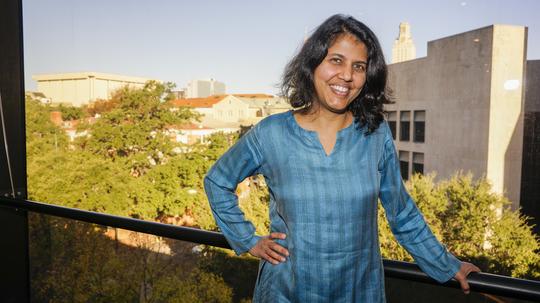
One of the biggest challenges in helping the community is knowing who needs what. And one of Austin’s fastest solutions to that was the Covid-19 ATX Exchange, which acts as a marketplace where organizations can request help – or offer to help others or donate.
The idea initially came from Mini Kahlon, vice dean of the health ecosystem at Dell Medical School, said Elizabeth Colvin, director of local affairs at Dell Medical School.
Aside from collecting requests, it vetted and prioritized needs to ensure scarce materials got to the groups that needed them most, especially groups that weren’t prioritized by other efforts. That included Integral Care, which helps people with mental disabilities, and Meals on Wheels.
Initially, masks, gloves and hand sanitizer were key focuses. But since then traditional sources have provided groups with many of those things.
“But we still have a demand for face masks, especially now that school is starting back up,” Colvin said.
Meanwhile, Dell Medical School has a contract tracing team. So the exchange partnered with that group to supply masks to households where someone had been diagnosed.
It was inspiring to see so many groups come together to help, Colvin said, including groups of refugees who sewed masks to sell and donate.
“It was really energizing,” she said. “Just the number of mask makers was amazing… they just must have been sewing around the clock to produce as many masks as they did.”
Armbrust American’s rapid rise in surgical mask manufacturing
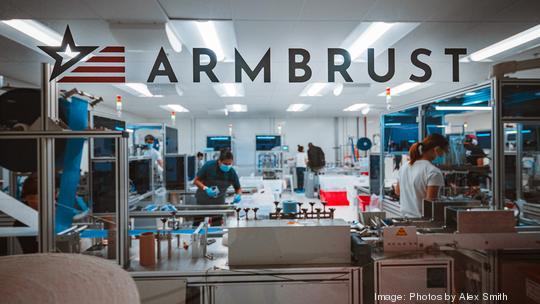
Speaking of masks, almost no one has made more of them than Armbrust American.
Shortly after the virus emerged and it became clear that masks would be key to our survival, Lloyd Armbrust, founder of Austin-based OwnLocal, took his base knowledge of air filtration and paired it with a knack for fundraising and began to build a mask-making factory in Pflugerville in January.
At the time, almost all the masks arriving in U.S. cities came from China. Armbrust saw an opportunity for American manufacturing, and sought to produce highly effective FDA registered surgical masks with ASTM Type-II certification. It now has seven automated lines in operation and is poised to reach a production rate of about 1.2 million masks per day.
In its early days, it even hosted walk-up order fulfillment to help show consumers the masks were made in Texas.
Since launch, it has processed nearly 1.5 million direct-to-consumer mask orders, as well as landing a $3.8 million contract with the state of Texas and a $4.5 million contract with the state of Illinois. Armbrust American, which has 52 employees now, is planning to hire 60 more people by the end of the year as it increases production.
The company has also donated more than 20,000 masks to organizations including The Thinkery!, Texas PTA and OBGYN North Austin.
Inno spoke extensively with Armbrust in a Bytes with the Beat event at the end of July. Check it out:
Babson Diagnostics becomes national leader in testing
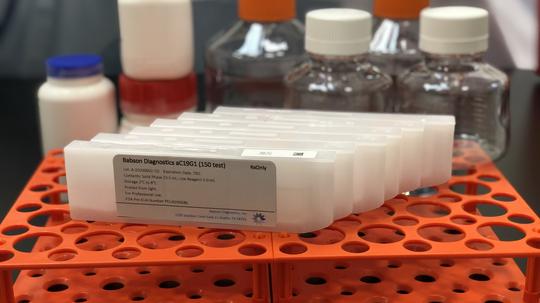
In early April, Austin-based Babson Diagnostics launched its Covid-19 serology testing service, which detects antibodies from blood samples to show if someone has had an infection in the past.
The company was developed to provide exceptionally accurate blood testing when it spun out from Siemens Healthineers in 2017. That made it somewhat of a natural fit for Covid testing. By late April, the company had launched its serology tests and shown 100 percent accuracy and sensitivity – a promising development at a time when many tests globally had proven inaccurate.
Then, in June, Babson landed the FDA’s emergency use authorization for the antibody test, making it among the first in the nation to get a green light.
“Not only is serology a crucial tool for the research and understanding of Covid-19, we believe it will become an essential component of ongoing preventive medicine,” Eric Olson, Babson’s founder and CEO, said in a statement. “The early success of our assays, combined with our ongoing clinical studies and research partnerships, will provide pivotal insights into Covid-19 immunity and help us develop future generations of tests.”
But its work is far from over. The startup has teamed up with Dell Medical School on long-term studies to track how Covid impacts patients over the course of two years. The initial phase is tracking 200 people who tested positive for the disease.
Austin’s medtech ecosystem has churned out several powerful innovations, including Everlywell’s at-home Covid-19 test kits.
“This research marks a vital step forward in understanding and managing Covid-19,” Esther Melamed, a neuroimmunologist and assistant professor in the department of neurology at Dell Med and principal investigator for the study, wrote. “Accurate testing for SARS-CoV-2 antibodies and a deeper understanding of the evolving adaptive immune response will help identify risk factors for Covid-19 disease severity and recovery, and will lead toward the next steps of identifying convalescent serum donors to treat the critically ill and developing protective vaccines.”
